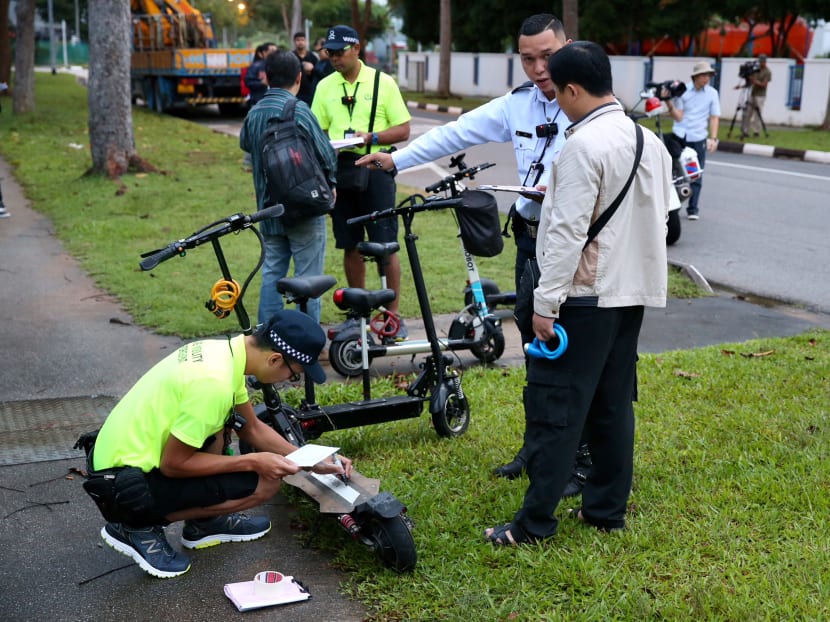Three-fold spike in accidents involving PMDs, bicycles and power-assisted bikes in 2017: Lam Pin Min
SINGAPORE — The number of reported accidents involving personal mobility devices (PMDs), bicycles and power-assisted bicycles tripled from 42 in 2016 to 128 last year, Senior Minister of State (Transport) Lam Pin Min revealed in Parliament on Friday (May 18).

PMD riders who were riding on the road were stopped and had their PMDs impounded by enforcement officers along Loyang Lane on January 15, 2018.
SINGAPORE — The number of reported accidents involving personal mobility devices (PMDs), bicycles and power-assisted bicycles tripled from 42 in 2016 to 128 last year, Senior Minister of State (Transport) Lam Pin Min revealed in Parliament on Friday (May 18).
In 2015, there were 19 reported accidents.
The authorities are quite concerned about the sharp rise, said Dr Lam.
He was responding to a question from Pasir Ris-Punggol Group Representation Constituency Member of Parliament Zainal Sapari, who asked about the recourse for accident victims who chalk up hefty medical bills without insurance coverage.
In light of the marked increase in accidents, Dr Lam said the Government has engaged the Active Mobility Advisory Panel to review measures that need to be taken.
These include speed limits on footpaths and whether there was a need for riders to don helmets. There have also been suggestions for riders to dismount and push their devices at traffic crossings, bus stops and crowded areas, as well as for an insurance and compensation framework, Dr Lam said.
“I will leave it to the Active Mobility Advisory Panel to advise us. They will be meeting and we’ll take reference from them,” he added.
The Government has not ruled out a licensing regime for PMD-sharing services, said Dr Lam.
It needs more time to understand the operational and safety processes of such services, which are relatively new and rather limited in Singapore.
His comments follow a string of new laws and regulations aimed at governing the use of such devices.
Earlier this month, strict penalties kicked in under the Active Mobility Act, which spells out where PMDs, bicycles and power-assisted bicycles can be used and how fast they can go.
For instance, power-assisted bicycles are not allowed on footpaths, where the speed limit is 15 kmh, while e-scooters cannot be used on public roads. PMD users involved in accidents will also face a maximum fine of S$3,000 or up to a year in jail, or both, if they do not stop and help victims.
From the second half of this year, owners of electric scooters, whether privately owned or shared, will have to register their devices and display identification stickers prominently.
The Government has a multi-pronged approach to deter reckless riding, said Dr Lam. This includes piloting innovative solutions and public education.
For instance, the Land Transport Authority has begun a trial using mobile closed-circuit TV cameras to identify and reduce errant riding of mobility devices on public paths, said Dr Lam.
Currently tested in areas like Ang Mo Kio and Yishun, it will be expanded if it shows results.
In February, the authority also started a Safe Riding programme to impart safe-riding practices to users and bring them up to speed with the rules and conduct under the Active Mobility Act.
“We definitely want to step up the public education effort, and at the same time, with the Active Mobility Act in force since May, I think that will actually serve as a strong deterrent factor for users who ride irresponsibly,” said Dr Lam.











